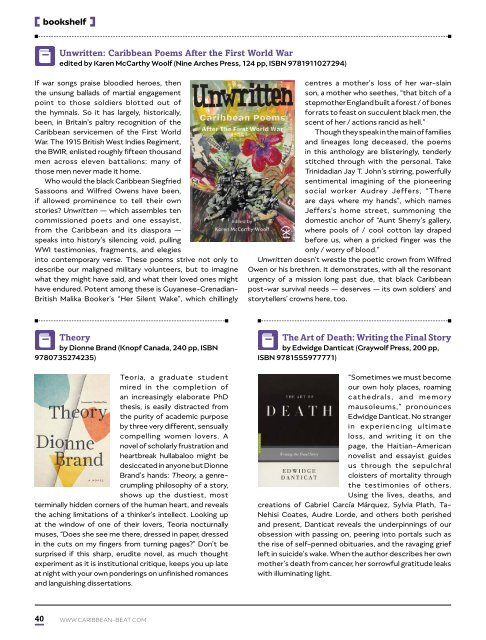Caribbean Beat — March/April 2019 (#156)
A calendar of events; music, film, and book reviews; travel features; people profiles, and much more.
A calendar of events; music, film, and book reviews; travel features; people profiles, and much more.
Create successful ePaper yourself
Turn your PDF publications into a flip-book with our unique Google optimized e-Paper software.
ookshelf<br />
Unwritten: <strong>Caribbean</strong> Poems After the First World War<br />
edited by Karen McCarthy Woolf (Nine Arches Press, 124 pp, ISBN 9781911027294)<br />
If war songs praise bloodied heroes, then<br />
the unsung ballads of martial engagement<br />
point to those soldiers blotted out of<br />
the hymnals. So it has largely, historically,<br />
been, in Britain’s paltry recognition of the<br />
<strong>Caribbean</strong> servicemen of the First World<br />
War. The 1915 British West Indies Regiment,<br />
the BWIR, enlisted roughly fifteen thousand<br />
men across eleven battalions: many of<br />
those men never made it home.<br />
Who would the black <strong>Caribbean</strong> Siegfried<br />
Sassoons and Wilfred Owens have been,<br />
if allowed prominence to tell their own<br />
stories? Unwritten <strong>—</strong> which assembles ten<br />
commissioned poets and one essayist,<br />
from the <strong>Caribbean</strong> and its diaspora <strong>—</strong><br />
speaks into history’s silencing void, pulling<br />
WWI testimonies, fragments, and elegies<br />
into contemporary verse. These poems strive not only to<br />
describe our maligned military volunteers, but to imagine<br />
what they might have said, and what their loved ones might<br />
have endured. Potent among these is Guyanese-Grenadian-<br />
British Malika Booker’s “Her Silent Wake”, which chillingly<br />
centres a mother’s loss of her war-slain<br />
son, a mother who seethes, “that bitch of a<br />
stepmother England built a forest / of bones<br />
for rats to feast on succulent black men, the<br />
scent of her / actions rancid as hell.”<br />
Though they speak in the main of families<br />
and lineages long deceased, the poems<br />
in this anthology are blisteringly, tenderly<br />
stitched through with the personal. Take<br />
Trinidadian Jay T. John’s stirring, powerfully<br />
sentimental imagining of the pioneering<br />
social worker Audrey Jeffers, “There<br />
are days where my hands”, which names<br />
Jeffers’s home street, summoning the<br />
domestic anchor of “Aunt Sherry’s gallery,<br />
where pools of / cool cotton lay draped<br />
before us, when a pricked finger was the<br />
only / worry of blood.”<br />
Unwritten doesn’t wrestle the poetic crown from Wilfred<br />
Owen or his brethren. It demonstrates, with all the resonant<br />
urgency of a mission long past due, that black <strong>Caribbean</strong><br />
post-war survival needs <strong>—</strong> deserves <strong>—</strong> its own soldiers’ and<br />
storytellers’ crowns here, too.<br />
Theory<br />
by Dionne Brand (Knopf Canada, 240 pp, ISBN<br />
9780735274235)<br />
Teoria, a graduate student<br />
mired in the completion of<br />
an increasingly elaborate PhD<br />
thesis, is easily distracted from<br />
the purity of academic purpose<br />
by three very different, sensually<br />
compelling women lovers. A<br />
novel of scholarly frustration and<br />
heartbreak hullabaloo might be<br />
desiccated in anyone but Dionne<br />
Brand’s hands: Theory, a genrecrumpling<br />
philosophy of a story,<br />
shows up the dustiest, most<br />
terminally hidden corners of the human heart, and reveals<br />
the aching limitations of a thinker’s intellect. Looking up<br />
at the window of one of their lovers, Teoria nocturnally<br />
muses, “Does she see me there, dressed in paper, dressed<br />
in the cuts on my fingers from turning pages?” Don’t be<br />
surprised if this sharp, erudite novel, as much thought<br />
experiment as it is institutional critique, keeps you up late<br />
at night with your own ponderings on unfinished romances<br />
and languishing dissertations.<br />
The Art of Death: Writing the Final Story<br />
by Edwidge Danticat (Graywolf Press, 200 pp,<br />
ISBN 9781555977771)<br />
“Sometimes we must become<br />
our own holy places, roaming<br />
cathedrals, and memory<br />
mausoleums,” pronounces<br />
Edwidge Danticat. No stranger<br />
in experiencing ultimate<br />
loss, and writing it on the<br />
page, the Haitian-American<br />
novelist and essayist guides<br />
us through the sepulchral<br />
cloisters of mortality through<br />
the testimonies of others.<br />
Using the lives, deaths, and<br />
creations of Gabriel García Márquez, Sylvia Plath, Ta-<br />
Nehisi Coates, Audre Lorde, and others both perished<br />
and present, Danticat reveals the underpinnings of our<br />
obsession with passing on, peering into portals such as<br />
the rise of self-penned obituaries, and the ravaging grief<br />
left in suicide’s wake. When the author describes her own<br />
mother’s death from cancer, her sorrowful gratitude leaks<br />
with illuminating light.<br />
40 WWW.CARIBBEAN-BEAT.COM


















